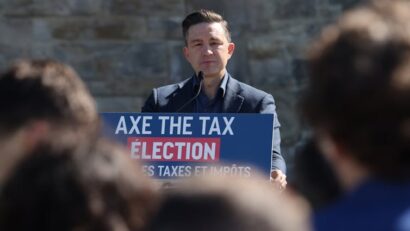
Trump threats: Is foreign policy the biggest issue for Canadian voters this election?
Canadians are heading once again to the polls on April 28 to vote in a federal election.
This election will offer voters competing visions of Canada’s future at a time when it has become all but impossible to separate foreign policy from domestic politics.
There’s no question much of the conversation during the campaign will centre on how the next government will deal with United States President Donald Trump amid his continuing threats to Canadian sovereignty.
But even though the Trump administration has undermined the liberal democratic world order in which Canada has prospered for close to a century, it’s unclear whether threats of a global tariff war, an ongoing divisive conflict in the Middle East and continued Russian aggression in Ukraine will directly affect how Canadians cast their votes.
Most political scientists have traditionally argued that foreign policy does not matter to Canadians at the voting booth.
But a recent book by historian Patrice Dutil has claimed that “at least half of Canada’s national elections featured substantive discussions of Canada’s place in the world.”
So who’s right?
Foreign policy as an issue
My new report, “Foreign Policy and Canadian Elections: A Review,” finds truth on both sides.
Foreign policy is what people who study elections call an “issue,” just like the economy, national security or health care.
Issues compete with many other considerations — like ideology, perceptions of leadership and the need for change — to determine a voter’s ultimate decision.
Local candidates can affect how people vote, as can party affiliation. If you live in a riding where your preferred candidate is unlikely to win, you might vote strategically.
According to Canadian political scientist Elizabeth Gidengil, for an issue like foreign policy to really matter in an election, it must satisfy three conditions:
Political parties must position themselves on opposite sides of it;
Voters must be aware of the differences between the parties’ views;
The balance of opinion on the issue must clearly favour one side over the other.
That rarely happens in relation to Canadian foreign policy. Our political parties don’t typically differ significantly on world affairs. When they do disagree, it’s unusual for the public to overwhelmingly support one side over the other.
Read more:
Trump’s potential embrace of ’continentalist geopolitics’ poses grave risks to Canada
Handling the Trump threat
There are no real divisions between the election’s front-runners — Liberal Mark Carney and Conservative Pierre Poilievre — over how to deal with Trump.
Both have pledged that Canada will never become the 51st state and have promised to strike back at American tariffs with economic measures of their own.
Poilievre says he’ll manage Canada-U.S. relations more effectively than the Liberals would, but he has not proposed any different tactics to do so.
On the other hand, Poilievre was clearly onto something in his endless quest to make the election all about the Justin Trudeau government’s carbon tax and rebate.
Conservative Party Leader Pierre Poilievre speaks at a news conference on Parliament Hill in Ottawa in August 2024.
THE CANADIAN PRESS/Patrick Doyle
Until Carney replaced Trudeau, the differences between the Conservatives and the Liberals on carbon pricing were stark. Thanks to an extraordinary Conservative marketing campaign, the Canadian public was well aware of those differences — and a significant majority of Canadians sided with Poilievre.
Now that Carney has axed the tax himself, those differences have become much less significant.
Domestic politics aside, Trump will still loom large throughout the next five weeks.
But international and domestic issues have been, and remain, sufficiently interconnected that it’s hard to discuss one to the exclusion of the other.
Free trade with the United States was a key topic of debate during four election campaigns — 1891, 1911, 1935, 1988 — because of its impact on Canadians’ sense of independence.
Canadians were divided over conscription during the 1917 election campaign. They differed over support for Britain during the 1956 Suez crisis and throughout the election the following year.
Just as the American invasion of Iraq split the Liberals and the Canadian Alliance during the election of 2003, so did attitudes towards increased defence spending in 2000. Canadian support for Syrian refugees came up regularly during the 2015 election campaign.
Still, it’s not clear if these differences affected more than a small number of individual Canadians when they marked their ballots.
Voters tend to cast their ballots emotionally, and even though Trump is preoccupying the national consciousness at the moment, the leading political parties have not offered us specific policy alternatives to deal with him.
What’s ahead this election campaign
Prime Minister Stephen Harper in the House of Commons on Parliament Hill in Ottawa in December 2011.
THE CANADIAN PRESS/Sean Kilpatrick
Over the next five weeks, Canadians should expect to learn about the leading political parties’ views on relations with the U.S., the situations in the Middle East and Ukraine, foreign interference in the affairs of state and Canada’s global defence.
Voters can and should demand that those who wish to lead the country are thoughtful and literate on these and other international issues.
As then Prime Minister Stephen Harper reflected in 2011:
“Since coming to office — in fact, since becoming prime minister [in 2006] — the thing that’s probably struck me the most in terms of my previous expectations … is not just how important foreign affairs/foreign relations is, but in fact that it’s become almost everything. There’s hardly anything today of any significance that doesn’t have a huge international dimension to it.”
But expecting party views on foreign policy to shape the election’s outcome is probably unrealistic.
When we head to the voting booths, most Canadians will likely just listen to their gut.
Exactly how Carney or Poilievre promises to deal with Trump probably won’t matter nearly as much as who they simply feel will do a better job on a host of issues. Läs mer…
